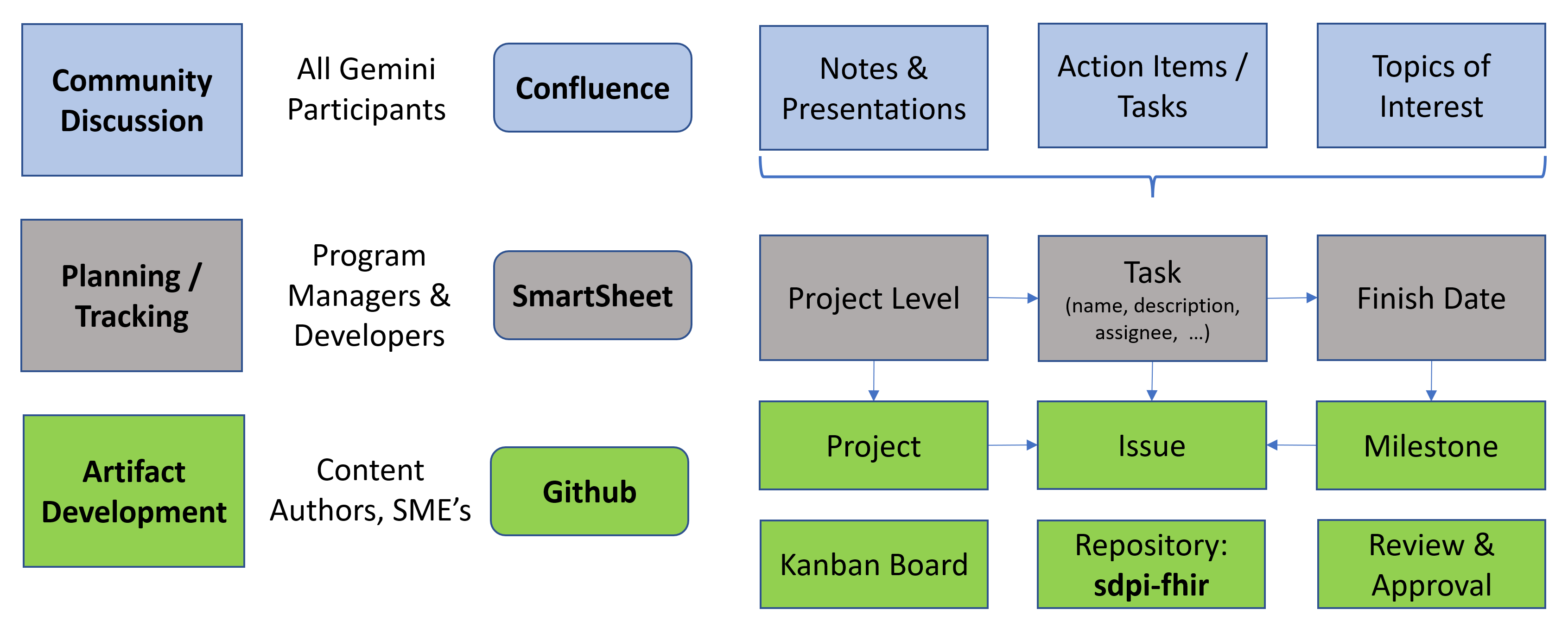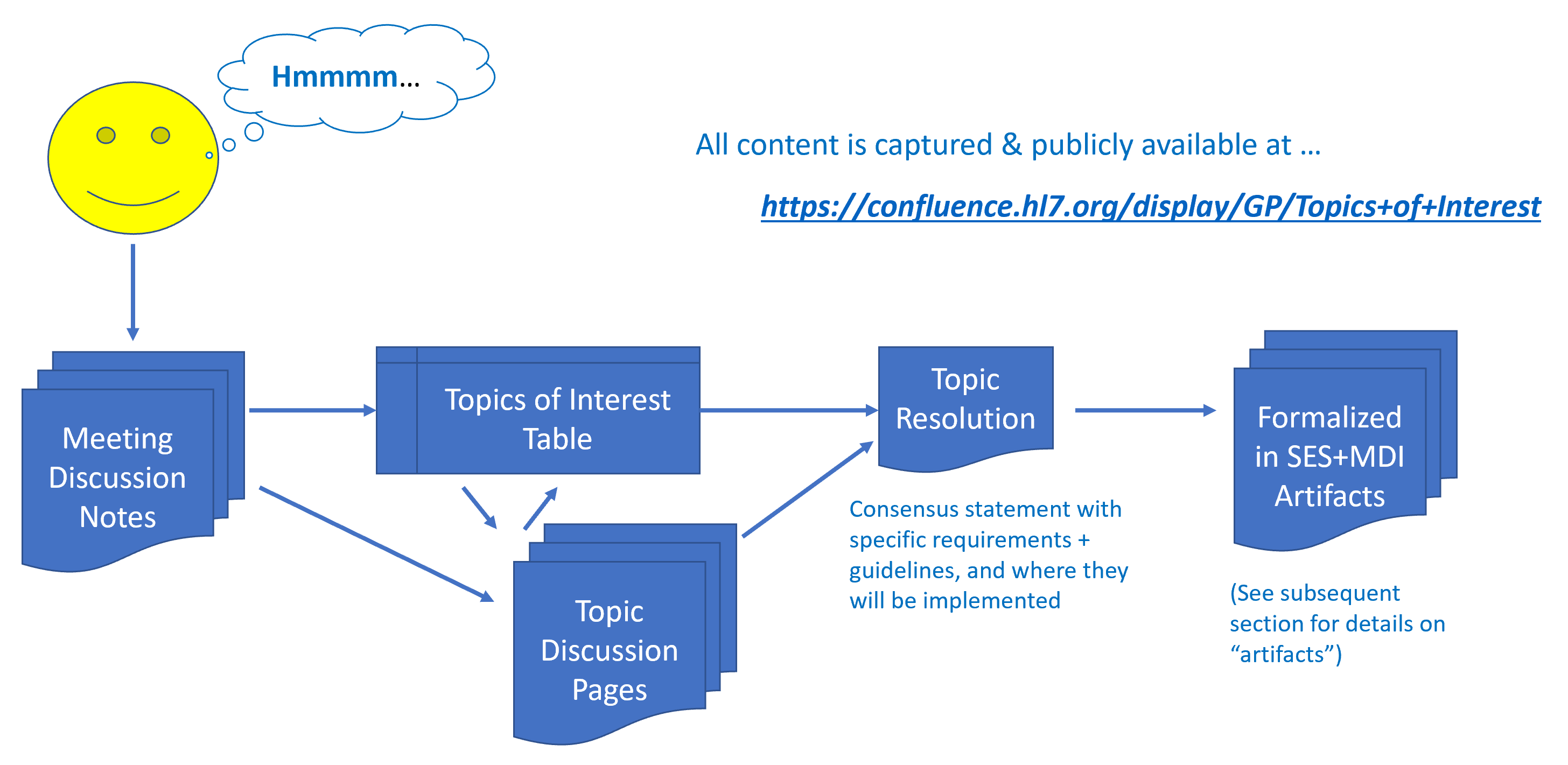-
Notifications
You must be signed in to change notification settings - Fork 1
Program Coordination Co Working Spaces
The joint IHE-HL7 Gemini SES+MDI program brings together a broad community of experts, not only from the devices (DEV) working groups of both organizations, but subject matter experts from other organizations (e.g., ISO/IEEE 11073) and industry at large (e.g., OR.NET consortium in Germany). These stakeholders each bring their own unique and important perspective on the program’s objectives — Creation of an Ecosystem of Plug-and-Trust interoperable medical device products that are Safe, Effect & Secure — meeting regularly, presenting & discussing the work at hand, planning and tracking the overall program activities, and focusing on the development of program "artifacts", especially the SDPi profiles specification.
This article describes the various communities at work within the Gemini project, with a particular focus on how they coordinate their efforts — both indiviually within a focus community as well as across the communities — and the tool chains that support this "co-working", from initial ideas and "topics of interest" to specific detailed changes in the artifacts they create. The following Gemini SES+MDI Program Community Co-Working Tooling Support provides an overview of the process and tooling that is used to support this co-working within the Gemnini SES+MDI program:

Though this illustration may appear over complicated, the three levels of focus actually result in efficient co-working for the different teams as they move from discussion and ideas to plans to development and implementation.
The following sections look at how each group manages and tracks their respective focus areas, and how they coordinate work across the three levels: Community Discussion to Planning / Tracking to Artifact Development.
Related information is provided in these additional articles:
The general Genii SES+MDI program community meets regularly and works to discuss their respective focus areas, working through various issues and topics, taking short term Action Items or Tasks, and accomplishing the overall work of the program. Currently there are three core groups within the community:
-
SDPi (Technical) Group - primary focus is on the development of the technical specifications and related documentation
-
Ecosystem Pathway (Process/Quality) Group - primary focus is on all the non-technical aspects that must be addressed to get a product to the market and in patient use (e.g., quality management, risk management, regulatory affairs, …)
-
Conformity Assessment (CA) & Tooling Gruop - primary focus is on the processes and tooling needed to ensure that solution developers and their products and services are fully conformant to the technical and process specifications from the other two groups
Co-Working Space Tooling Focus: Confluence
Each group also has a set of Topics of Interest (ToI) that they maintain for discussions that take longer than a specific meeting and that when resolved will impact the program work and associated program plan.
For each of these groups, there are a set of core Confluence page links that capture discussion Notes & Presentations, Action Items / Tasks, and Topics of Interest:
-
SDPi Group
-
Home: See the general Gemini SES+MDI Program pages including
-
https://confluence.hl7.org/x/4ijxB[Hanging Gardens Framework (general standards & architectural approach)
-
Meeting Notes: Meeting Logs & Notes
-
Action Items / Tasks: SDPi Action Items / Tasks (general)
-
Topics of Interest: SDPi Topics of Interest
-
-
EP Group
-
Meeting Notes: Gemini 2022 EP Discussion Notes
-
Action Items / Tasks: EP Action Items / Tasks
-
Topics of Interest: EP Topics of Interest Table
-
CA Group
-
Meeting Notes: CA & Tooling Discussion Notes
-
Action Items / Tasks: CA & Tooling Action Items / Tasks
-
Topics of Interest: ToI table not yet defined; see PAT - Findings from Testing Events
To participate in any of the regularly scheduled Zoom meetings, please contact Todd Cooper or John Rhoads.
During each group’s discussions, they may come up with short term action items or tasks that need further effort but outside of the core deliverables and activities of the program plan. Each group captures these in the discussion notes and regularly reviews them on their Action Items pages. Action Items may include finding some references for the group or creating a graphic or consulting with some other experts, etc.
Ultimately these short term / informal items are either completed, or they may result in additional issues or deliverables that need to be integrated into the program plan (see Program Planning & Tracking ) or specific deliverables (see Artifact Development & Project Tracking ).
When topics or issues are indentified during a group’s discussions and it is determined that more investigation will be required to both understand the issue as well as come to a consensus approach, a "Topic of Interest" is created for the group, serving as a home for the focused discussions and ultimately for its resolution. The following graphic illustrates this process:

If the consensus resolution results in "Formalized in SES+MDI Artifacts", this will include addition of one or more tasks and milestones to the program plan (see Program Planning & Tracking ) and deliverables and project issues and milestones to the program repository (see Artifact Development & Project Tracking ).
Although the primary technical focus of the Gemini SES+MDI program is the creation and maintenance of the SDPi specification ( as a supplement to the IHE Devices (DEV) Technical Framework), additional deliverables may be crafted such as an EP Guidance document or a paper on how product conformity assessment and "regulatory submission ready" test reports will be achieved. This may also be part of a ToI resolution, for example, a guidelines document for how networks of SDPi plug-and-trust products should be configured to properly support alarm delegation, "cDAS" systems and smart alerting components. Though all the technical provisions may be included in the SDPi specification, a document such as this would provide additional help for implementers that may not be clear when reviewing the specifications.
In these cases, a work stream will be added to the program, along with milestones and tasks, and then a home in the DEV.SDPi repository will be created for the document, and it will be developed in the same way as the core SDPi specification.
|
Note
|
Another alternative is to create a different github repository for each document or paper (or other deliverables) to be created. Perhaps if the work was starting fresh, this would be a preferred approach; however, at the 2.5 year stage, we have the DEV.SDPi repository that is used to persist all the project materials to date. This includes presentations (PDF and pptx), models and other xml files, document drafts and supporting content, etc. As a result, it is easier to continue this one-repo approach and to manage it (e.g., by the folder structure and projects / issues / labels etc) as we are for all the other work items. |
Though the core work of the Genini SES+MDI program is covered above there are additional activities, workstreams and deliverables that should be factored in at some point. For example, the creation of educational materials to help those who are reviewing, adopting or implementing the specifications. Integration of these may be added at a later date when needed, but it is expected that they will leverage the same co-working spaces as above, though, specialized groups (other than SDPi / EP / CA) may be created for those purposes.
As the Gemini communities — SDPi, Ecosystem Pathway, and Conformity Assessment & Tooling — identify program deliverables and tasks, these are formalized in a project planning and tracking tool: SmartSheet.
|
Note
|
Why SmartSheet? As is the case with most of the technologies and tools used by the IHE-HL7 Gemini project, it is a combination of availability, ease of use, and familiarity by those actually doing the work and using the tool. In this case, the tool is easy to use, to share via the cloud, to allow multiple users to simultaneously update, etc. Will this tool be used … forever?! Maybe … but probably not. for now, though, it fits a key need for the project team and will enable productive coordinated co-working through 2023. |
Co-Working Space Tooling Focus: SmartSheet
The Gemini SES+MDI Program plan currently (2022.08) includes detailed Tasks and Finish Dates for the following projects:
-
IHE Specification Transition to RI+MC+RR Support — Focuses on the use of AsciiDoc, Github, HTML publication, etc. to support the program objectives: RI+MC+RR (Requirements Interoperability + Model Centric + Regulatory submission Ready)
-
IHE SDPi Specification (1.0) — This is the detailed tasking around the creation of the first version of the SDPi profiles specification, up through submission for Trial Implementation (TI) publication.
Specific detail as to capabilities supported by SDPi 1.0 and subsequent versions is provided in the article: SDPi Editorial Plan & Versions.
Note that there are other project areas contained within the plan sheet. These will be detailed out as the communities continue to discuss and refine the planning. Additionally, specific project deliverables such as an "Ecosystem Pathway Guidelines" document, or a "Conformity Assessment Strategy" document have yet to be added to the plan. Stay tuned!
As illustrated in Gemini SES+MDI Program Community Co-Working Tooling Support above, the detail in the planning sheet is at the Project, Tasks + Finish Date high-level. The intent is to only include the level of detail necessary to ensure coordination and the ability to track progress. Most of the co-working detail will be managed in Github at the development aspect of the program work.
TODO: When actual development work is ready to begin, it will be managed and tracked using github Projects / Milestones / Issues / Branch-Pull-Merge / Kanban Board … use of labels for grouping; possibility of milestones / projects covering multiple repos (out of scope but mention it)
Once the project planning is complete (at least at an initial level), then the core focus of activity is within the program’s IHE github repository: DEV.SDPi.
Co-Working Space Tooling Focus: Github
The following article provides detail for how github is used to facilitate and manage each project’s development activities: Managing SDPi Development Using GitHub Projects
As shown in the graphic above, SmartSheet constructs are lined to Github constructs, namely:
-
Project ⇒ Project
-
Task ⇒ Issue
-
Finish Date ⇒ Milestone
Given the limited level of detail at the project/task planning level, additional subtasks may be added in the Github Issue (as Task boxes). This helps ensure that a limited amount of information is duplicated between the two tools and that the project management content only has the level of detail necessary to plan and track program activities.
The integrated project "kanban" board allows for easy viewing of development activity status. All artifact updates are persisted in the repository (DEV.SDPi), and all review discussions, decisions / resolutions, and approvals are also captured.
|
Note
|
Automation between SmartSheet and Github is possible (there are a number of open source tools available), but at the present, the updates (e.g., task status and completion or milestone changes), will be accomplished manually. |
As shown on Gemini SES+MDI Program Community Co-Working Tooling Support, connections from the community discussions are formalized in and linked to project planning & tracking sheets, which are in turn linked to the detailed work of developing and managing project deliverables.
Simple URL links between each of these layers helps ensure connection. For example, though the detailed review of tasks is captured in github, general notes from the meeting are recorded in Confluence. To ensure the "loop is closed" between the tooling and layers, URL links can be placed in both the discussion notes and the github issue being reviewed. This is particularly useful when there are weekly group reviews (e.g., in the SDPi Friday meetings) and there is a need to capture both who was present in the meeting as well as additional discussion that is related but not included in the Github review details.
One fact — one place — Ain’t it wundurful?!
Gemini SES+MDI Program
Gemini SES+MDI Program articles …